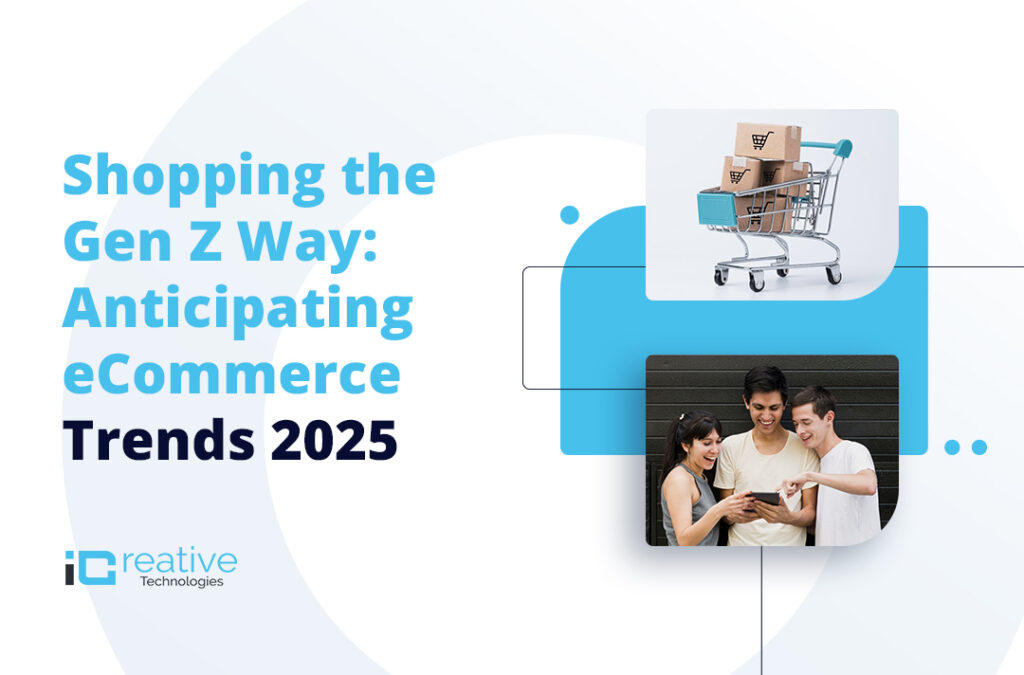
Born between the late 1990s and early 2010s, Gen Z is revolutionizing the world of eCommerce. Growing up with smartphones, social media, and constant connectivity, this generation brings a new paradigm of expectations to a shopping experience. Tech-savvy, value-conscious, and socially driven with their choices, Gen Z does not only purchase; it aligns itself with a brand because that brand seems to reflect its values and satisfy highly personalized preferences.
By 2025, to match the expectations of Gen Z, eCommerce websites would have to break their legs and adapt quickly. Shopping experiences would be rewritten so that they can fulfill GenZ’s needs, considering efficiency, authenticity, and sustainability.
Understanding Gen Z: Why is Ecommerce Dependent on Them?
Characteristics of Gen Z Consumers
Digital natives
For GenZ, the internet is the only world they know. Over 32% of the generation shops online daily. For most of them, mobile devices are the primary tool for browsing, researching, and even purchasing products. For such platforms as Instagram, TikTok, or Snapchat, they’re not only social but are proven parts of the shopping funnel, through features like shoppable posts and in-app purchase capabilities.
Ethical shoppers
Gen Z’s choice of brands includes brands with social and environmental responsibility. They claim visibility on supply chains, expect brands to carry sustainability certifications, and actively engage in causes that go for carbon-neutral shipping or sourcing. Businesses that aren’t in sync with these priorities, can be alienated by this influencing demographic.
Personalization-focused
Hyper-personalized experiences are the new norm. Gen Z expects that companies will use AI-driven algorithms that could recommend personalized products to them, suggest complementary items, and provide customized discounts. It also increases loyalty while amplifying the general user experience.
Instant gratification
Where overnight delivery and live notifications are the norm, Gen Z expects immediacy in every connection. From rapid responses & customer service chatbots to same-day delivery options on the shelf, businesses need to operate efficiently to meet those expectations.
All the above characteristics translate into specific demands that determine how eCommerce trends must evolve:
- Experience over products: Gen Z prefers the experience of brands with an emotional connection rather than merely purchasing goods. Online experiences should be highly immersive for them.
- Authenticity is the key to Gen Z: They need brands that are authentic and truthful rather than pseudo-marketing tricks.
These eCommerce trends catering to Gen Z, are Genius!
Social Commerce Integration
Social commerce is rapidly turning into the new storefront for Gen Z consumers, with the likes of TikTok and Instagram. The future of in-app shopping transforms the journey through the customer, completing a full purchase without exiting favorite social platforms. Live-stream shopping is where the influencer showcases products and answers real-time questions to create an engaging and instantaneous path to buy. Brands utilize these streams to blend entertainment with commerce to maximize effects.
Enhanced Mobile-First Experiences
Capturing the interest of Gen Z will depend on optimized mobile experiences.
For example, One-click checkouts simplify purchases, reducing cart abandonment rates significantly. Progressive Web Apps will have the same speed and usability as an app and the flexibility of a website, providing a smooth browsing experience without downloads.
AI-Powered Personalization
Highly tailored shopping experience, Artificial Intelligence is at the forefront.
AI-powered product recommendations include products that have been viewed, preferences, and other social activities. Interactive shopping assistants also replicate the in-store experience online, helping GenZ customers find products that will suit their style, budget or something very specific.

Gamification of Shopping
Interactive and rewarding experiences through the conversion of shopping will keep Gen Z’s engagement always alive. Virtual eCommerce often incorporates AR/VR tools, which allow customers to see the product in a real-world setting a sofa in your living room or clothes on your body. Gamified loyalty programs are a huge hit, as they offer users points, badges, and exclusive discounts through which a positive & addictive loop is created, enticing further purchases.
Sustainability
As a sustainable consumer, Gen Z focuses on this value for every purchase. Environment-friendly filters and recyclable packaging are among the features, that are attractive to this target market. Companies now provide carbon-neutral delivery options and integrate supply chain transparency through their platforms to demonstrate commitment to sustainability.
Here are some great eCommerce Marketing Strategies for Gen Z in 2025
Micro-moment targeting
Gen Z listens to contextualized marketing that speaks to their momentary needs.
Predictive analytics enables brands to target their customers when they need them most – at particular points of seasonal buying. Real-time offers and notifications enhance engagement by creating a sense of urgency.
Exclusive drops and limited-time offers
The FOMO effect is the biggest reason driving Gen Z:
They generate buzz and drive conversions through exclusive product launches and flash sales. Campaigns involving the use of NFTs and digital collectables offer the tech-savvy buyer, great sales opportunities.
Community-driven marketing
Building brand communities can achieve authenticity, which is valued by Gen Z. Platforms, such as Discord or Reddit, provide direct interaction with loyal customers. Creating product reviews and unboxing videos can work well as user-generated content to raise trust and enhance close connections.
Voice & visual search optimization
It is vital to embrace the likes of Gen Z, who favor visual and hands-free communications. For example, the listings optimization for voice search allows the product to be visible for buyers who use Siri, Alexa, or Google Home assistants. Through the image recognition feature, shoppers can find specific products by uploading pictures, making the process highly streamlined.

Challenges and how eCommerce Platforms can Adapt to them?
Overcoming ad fatigue
Gen Z is immune to traditional advertising and seeks to view content meaningful to them. Storytelling campaigns branded around real-life stories do better than hard-sell pitches. Native advertising feels less intrusive and more likely to engage the audience, which means ads that blend seamlessly into their browsing experience.
Cybersecurity & data privacy
With Gen Z, being well-informed regarding data risks about privacy, trust becomes a major factor. Implementing robust cybersecurity measures and displaying trust badges builds confidence. Transparent data usage policies reassure Gen Z that their information is safe.

Conclusion
eCommerce trends will be forced to meet the expectations of Gen Z, in 2025. This generation has significantly recreated the marketplace by commanding personalization, sustainability, and efficiency at every touchpoint. From social commerce integrations to AI-powered personalization, businesses that adapt will survive and thrive.
Placing authenticity, innovation, and the user experience in the forefront, marketplaces will be headliners in this increasingly competitive space. The future belongs to brands that understand, grasp, and deliver these unique values of Gen Z and make the brand indispensable, not just relevant.
FAQ’s
Customization improves the shopping experience, increases loyalty, and drives conversions. Tools like AI-driven recommendations, interactive chatbots, and tailored discounts make shopping more engaging and efficient.
Major eCommerce trends include AI-driven personalization, mobile-first shopping, social commerce, augmented reality (AR) experiences, voice commerce, subscription models, sustainable shopping, faster delivery options, and the growth of Buy Now, Pay Later (BNPL) services. These trends are reshaping the way consumers shop and engage with brands.
Security challenges include data privacy risks, the potential misuse of AI in fraud detection, vulnerabilities in blockchain systems, and increased cyberattack risks on interconnected platforms. To address these concerns, brands must implement strong encryption, transparent data handling, and proactive cybersecurity measures.
Bhavya Shah
Bhavya Shah is a Business Analyst at iCreative Technologies. He specializes in the eCommerce consulting for all business domains. He is working hand-in-hand with developers and clients to produce requirements and specifications that accurately reflect business needs and are technologically achievable.





